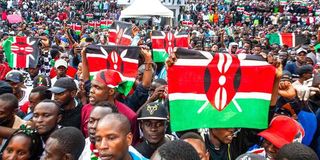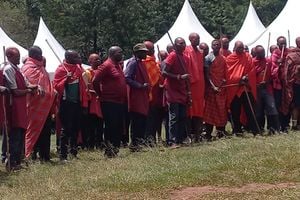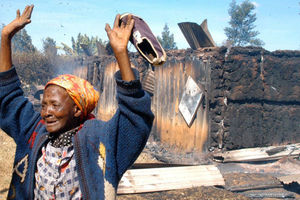
Participants during the Shujaaz Memorial concert held on July 7, 2024 at Uhuru Park in Nairobi.
Sports Cabinet Secretary Kipchumba Murkomen sometimes comes across as one of the few sober and reasonable men in President William Ruto’s inner circle. But he does have a habit of attracting attention for all the wrong reasons.
A clear example is in the video presently doing the rounds in which Mr Murkomen claims that criticism of Dr Ruto is driven by tribalism.
That might sound like the wild ranting of some of those individuals forever trying to catch the President’s favours with the most ridiculous defences of the regime, but further scrutiny shows that the tribalism card is actually a well-crafted strategy.
Kenya has a history of regimes facing pressure for their misdeeds sowing the seeds of tribal war. In most instances, it is not just about identifying and demonising an ‘enemy’ group, but rallying the ‘ruling’ ethnic group against a foe supposedly out to take away their privileges.
President Jomo Kenyatta did it with the infamous 1969 Gatundu oathing of his Kikuyu community to ensure that his people defended the leadership against the threat of an opposition led by the Luo people of his former Vice President Oginga Odinga. It was a virtual declaration of war in which President Kenyatta’s tribesmen were given the licence to hunt down, maim and kill the identified enemy.
A similar strategy was seen in 1990 when an increasingly desperate President Daniel arap Moi resorted to the ethnic defence against the growing clamour for return of multi-party democracy.
Ethnic militia
President Moi’s political surrogates traversed the Rift Valley heartland of his power base, mobilising against ‘outsiders’ out to take away their leadership.
The outcome was the infamous ‘Kalenjin warriors’, an ethnic militia formed and armed by the ruling party machinery to wage war on neighbouring ethnic groups seen as proponents of the democratisation campaign.
Kenya has never been the same again. Armed ethnic mobilisation on industrial scale became the norm for any regime out to preserve its rule, and any other group out to assert itself.
The 2007–08 post-election violence following on President Mwai Kibaki’s stolen re-election victory was the closest Kenya has ever come to full-scale ethnic civil war. Both sides—President Kibaki’s ruling Kikuyu elite and the opposition constellation of Raila Odinga’s Luo, Wiliam Ruto’s Kalenjin and Musalia Mudavadi’s Luhya—assembled armed militia and wild mobs to wage warfare that nearly led Kenya down a dark precipice.
Politically incorrect
Now, it might seem crude and politically incorrect to put things in such stark terms. Too often in Kenyan media, we shy away from identifying ethnic belligerents, preferring the much more polite ‘certain community,’ but when danger stares us in the face, truth must be told so that we can confront the risk head-on and steer the country back on the right path.
The tribalism card being played by President Ruto’s men to counter criticism of his reign is dangerous. It is designed to rally his community against a specific identified foe; and the outcome could well be a declaration of war that could see a replay of President Moi’s 1990 ethnic clashes or President Kibaki’s 2007–08 post-election violence.
Mr Murkomen and the other lose tongues around the President crying ‘tribalism’ when their iniquities are called might well claim justification for their rantings.
Impeached Deputy President Rigathi Gachagua played the tribal card to some effect in his insurrection from within and his push to assume ‘King of the Kikuyu’ mantle.
If he gets to control politics of the populous community that provided nearly 50 per cent of the vote that propelled President Ruto to victory at the 2022 elections, he will pose a potent threat come the next polls.
Mr Gachagua also has around him lose-tongued fellows who revel in base ethnic politics, as witnessed on Sunday with Nyeri Governor Mutahi Kahiga’s threats against members of the Kikuyu community who do not line up behind the former DP.
That primitive brand of politics is no justification for equally primitive responses, especially from those who control the levers of state and enjoy a certain monopoly of violence.
The Gen Z revolt was not tribal, and neither is the criticism delivered by church leaders. It is actually dangerous when President Ruto dismisses criticism as “evil spirits” and “enemies of the Nation”.
When he drives and encourages those narratives, he might well be tempted, like South Korean President Yoon Suk Yeol did in in response to stalled budgetary proposals, to declare martial law. The coup failed spectacularly.
President Yoon has been impeached and is under criminal investigation. There is a lesson for us from South Korea.
[email protected]; @MachariaGaitho










